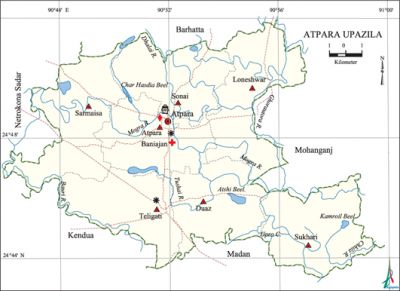Atpara Upazila
Atpara Upazila (netrokona district) area 192.50 sq km, located in between 24°44' and 24°52' north latitudes and in between 90°46' and 90°59' east longitudes. It is bounded by barhatta upazila on the north, kendua and madan upazilas on the south, netrokona sadar upazila on the east, mohanganj upazila on the west.
Population Total 144624; male 72117, female 72507; Muslim 131332, Hindu 13144, Buddhist 2, Christian 13 and others 133.
Water bodies Main rivers: Mogra, Bauri, Ghorautra, Chhila and Tushai; Kamroil beel, Atshi beel' and Ukhro canal are notable.
Administration Atpara Thana was formed in 1926 and it was turned into an upazila on 2 July 1983.
| Upazila | ||||||||
| Municipality | Union | Mouza | Village | Population | Density (per sq km) | Literacy rate (%) | ||
| Urban | Rural | Urban | Rural | |||||
| - | 7 | 142 | 177 | 9687 | 134937 | 751 | 47.6 | 38.1 |
| Upazila Town | ||||||||
|
Area (sq km) |
Mouza |
Population |
Density (per sq km) |
Literacy rate (%) | ||||
| 9.04 | 2 | 9687 | 1031 | 47.6 | ||||
| Union | ||||
| Name of union and GO code | Area (acre) | Population | Literacy rate (%) | |
| Male | Female | |||
| Teligati 83 | 6359 | 11819 | 11976 | 37.6 |
| Duaz 23 | 6286 | 8202 | 8332 | 38.8 |
| Baniajan 11 | 6050 | 10657 | 10787 | 47.6 |
| Loneshwar 35 | 8512 | 10004 | 10285 | 38.8 |
| Sarmaisa 47 | 7094 | 11660 | 11621 | 39.9 |
| Sukhari 59 | 7271 | 10483 | 10230 | 35.0 |
| Sonai 71 | 5938 | 9292 | 9276 | 38.6 |
Source Bangladesh Population Census 2011, Bangladesh Bureau of Statistics.
Archaeological heritage and relics Three domed Saramushia-Haripur Mosque (Mughal period), remnants of Roy Bari (zamindar) of Rameshwarpur.
War of Liberation On 19 August 1971 the freedom fighters attacked the Atpara Thana and killed a number of razakars and the OC of the Thana; they also captured arms and ammunitions of the Thana. On 7 October a battle was fought between the freedom fighters and the Pak army and the razakars in which three razakars were killed.
For details: see আটপাড়া উপজেলা, বাংলাদেশ মুক্তিযুদ্ধ জ্ঞানকোষ (Encyclopedia of Bangladesh War of Liberation), বাংলাদেশ এশিয়াটিক সোসাইটি, ঢাকা ২০২০, খণ্ড ১।

Religious institutions Mosque 218, temple 44, sacred place 1.
Literacy rate and educational institutions Average literacy 38.7%; male 40.3% female 37.1%. Noted educational institutions: Mongolshiddo MS Junior School (1925), Dhormorai Ramdhan High School (1930), Teligati BNHK Academy (1905), Baniajan City High School (1940), Gopalshram Bhairabchandra High School (1930).
Cultural organizations library 1.
Main sources of income Agriculture 76.46%, non-agricultural labourer 2.04%, commerce 8.10%, transport and communication 1.17%, service 3.69%, construction 0.94%, religious service 0.35%, rent and remittance 0.47% and others 6.61%.
Main crops Paddy, linseed, vegetables.
Extinct or nearly extinct crops Jute, tobacco, sweet potato, arahar, khesari, muk and black gram.
Main fruits Mango, jackfruit, banana, litchi, black berry, papaya, betel nut, olive, lotkan, shaddock, coconut.
Fisheries, dairies and poultries Fishery 12, poultry 255, dairy 1.
Communication facilitie Roads: pucca road 55.5 km, semi pucca road 8.39 km, mud road 232.71 km; waterway 31 km.
Extinct or nearly extinct traditional transport palanquin, horse carriage and bullock cart.
Noted manufactories Saw mill, chira mill, oil mill, spices mill, ice cream factory, rice mill.
Cottage industries goldsmith, blacksmith, potteries, weaving, bamboo works, woodworks.
Hats, bazars and fairs Noted hats and bazars and fair are Teligati, Nazirganj, Brojer, Avoypassa, Lalchan, Loneshwar, Konapara, Bousha bazar and Austomi Mela.
Main exports Paddy, banana, betel nut, fish, lotkan, olive, shaddock and leather.
Access to electricity All the unions of this Upazila are under electricity net-work; however, 27.1% dwelling households have access to electricity.
Sources of drinking water Tube-well 90.0%, tap 0.2% and others 9.8%. Arsenic contamination has been detected in shallow tube-well water of the upazila.
Sanitation 41.2% of dwelling households of the upazila use sanitary latrines and 48.5% of dwelling houses use non-sanitary latrines; 10.3% of households do not have latrine facilities.
Health centres Upazila health complex 1, union health and family planning centre 2, satellite clinic 2, Red Crescent Hospital 1.
NGO activities Operationally important NGOs are asa, brac, proshika, Atta Karma Sangsthan Jubo Kalyan Samiti. [Bivuti Ranjan Ray]
References Bangladesh Population Census 2001 and 2011, Bangladesh Bureau of Statistics; Cultural survey report of Atpara Upazila 2007.
